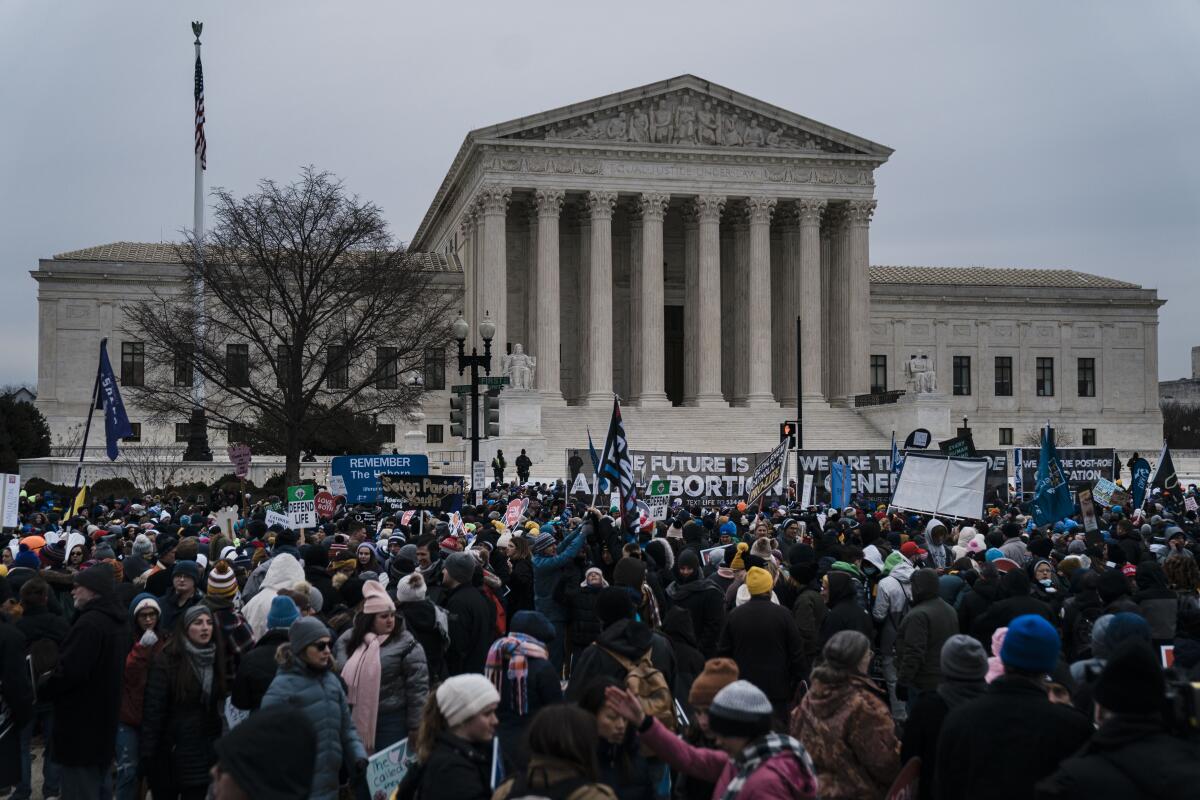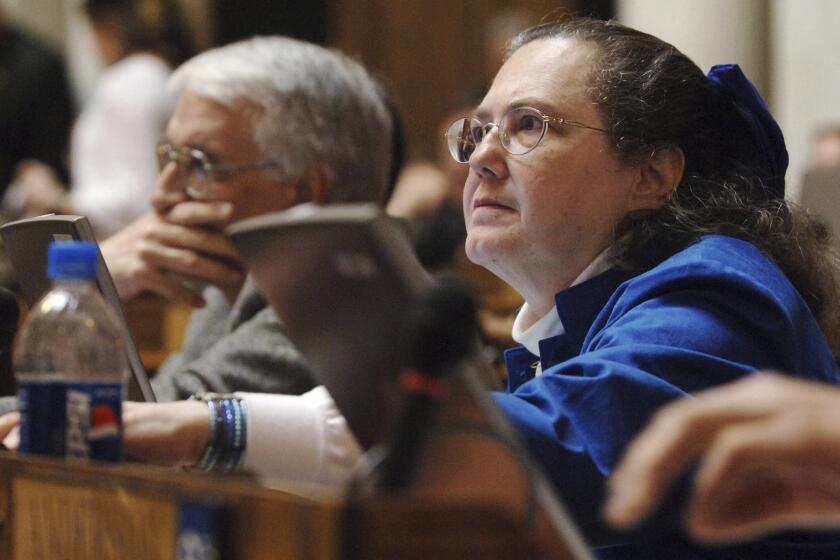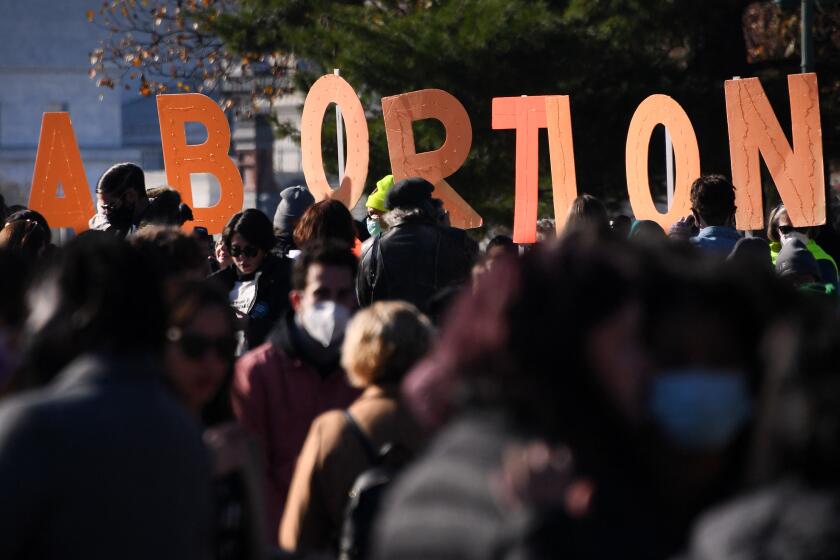Antiabortion protesters optimistic at March for Life in D.C.

- Share via
WASHINGTON — Thousands of antiabortion protesters were in a celebratory mood Friday as they rallied in the nation’s capital and marched to the Supreme Court with a growing sense of optimism that they might reach their goal: a sweeping rollback of abortion rights.
The March for Life, an annual antiabortion protest that has taken place for decades, was held as the Supreme Court has signaled that it will rule in the coming months that states may impose tighter restrictions on abortion — and that it could possibly overturn Roe vs. Wade, the landmark 1973 ruling that affirmed the constitutional right to an abortion.
“It doesn’t feel real. There’s so much hope and vibrancy and happiness and joy at this thing,” said Jordan Moorman of Cincinnati. “I really do believe that we’re in a post-Roe generation.”
The rally, held one day before the 49th anniversary of the Roe decision, took place amid a coronavirus surge that limited turnout on the National Mall. Some abortion opponents posted on the event’s Facebook page that they would not attend because of COVID-19 vaccine mandates for people going to restaurants and other places in the nation’s capital.

Still, the rally drew a crowd of thousands on a sunny but frigid day, with a heavy contingent of young people and students bused in by schools and church groups. The mood was overwhelmingly optimistic, with many treating the end of Roe vs. Wade as an inevitability.
“Hopefully this will be the last March for Life,” said Father Andrew Rudmann, a Roman Catholic priest from New Orleans, who was attending for the 11th time.
West Virginia lawmakers have introduced a bill to ban abortion after 15 weeks — a proposal that’s nearly identical to the Mississippi law currently under review by the U.S. Supreme Court.
Rudmann said previous marches may have had larger crowds, but he didn’t recall this level of optimism. He said the crowds grew “gigantic” under former President Trump and the movement’s enthusiasm grew with each of Trump‘s Supreme Court selections. Rudmann proudly pointed out that his home Archdiocese of New Orleans includes the Catholic high school that educated Trump’s last appointee, Justice Amy Coney Barrett.

“Sometimes I would come to the march and it would be great to be united with people who share my beliefs, but there would also be this heaviness,” he said. “This time the whole language and vibe is different.”
After the rally, the crowd marched to the Supreme Court with chants that included: “We love babies, yes we do, we love babies, how ’bout you?” and “Hey hey, ho ho, Roe vs. Wade has got to go!”
In the upcoming session, California legislators hope to push forward Senate Bill 245, which would put an end to out-of-pocket costs paid by those seeking abortions.
Abortion rights groups worry that at least 26 states are in line to further limit abortion access if Roe is weakened or overturned. While hearing a major case in December, a majority of justices signaled they would vote to uphold a Mississippi ban on abortions after 15 weeks of pregnancy, and allow states to ban abortion even earlier. The Mississippi case directly challenges Roe.
Courts have also dealt Texas abortion providers a string of defeats in efforts to block a law that, since September, has effectively banned abortions once “cardiac activity” is detected in the fetal cells, which is usually around six weeks — before some women know they are pregnant and several weeks before the cells begin to form the heart.
Another loss for Texas clinics came Thursday when the Supreme Court refused to speed up the challenge to the law, which providers say is now likely to stay in effect for the foreseeable future.
“This law is cruel and unconstitutional, and I am deeply disappointed that our judicial system has done very little to stop it,” said Amy Hagstrom Miller, president of Whole Woman’s Health, which operates four abortion clinics in Texas.
Lawmakers from both major parties weighed in Friday to note the anniversary of Roe vs. Wade and reflect on the shifting political landscape surrounding abortion.
Start your day right
Sign up for Essential California for the L.A. Times biggest news, features and recommendations in your inbox six days a week.
You may occasionally receive promotional content from the Los Angeles Times.
“It has been an eye-opening year for the cause of life in America, and we have made significant progress in defending our youngest and most vulnerable,” House Minority Leader Kevin McCarthy (R-Bakersfield) said.
Sen. Jeanne Shaheen (D-N.H.) said: “The stakes are higher than ever, with the health and autonomy of women and families across the country hanging in the balance as Republicans work to methodically challenge and overturn Roe.”
“It’s time to sound the alarm and make clear: Decisions about our bodies, our healthcare and our future belong to us,” she added.
Dozens of GOP lawmakers appeared at the march or on video voicing their allegiance with those in attendance.
White House Press Secretary Jen Psaki took note of the anniversary of Roe vs. Wade in her Friday news briefing, saying that “reproductive healthcare has been under extreme and relentless assault ever since, especially in recent months.”
She said the Biden administration was committed to working with Congress to pass a bill that protects the right to provide and access abortion care without forced waiting periods, biased counseling and other restrictions.
“We’re deeply committed to making sure everyone has access to care, and we will defend it with every tool we have,” Psaki said.
Mississippi state Sen. Joey Fillingane, a Republican who pushed for the state’s strict abortion laws, said that if Roe is nullified, he expects states to take different approaches to setting their own abortion laws.
“I think that’s the way it should be,” he said. “The laws in California, based on their population and what they want, may be very different than the laws in Mississippi based on what our population feels about the issue of life.”
Associated Press writer Kevin Freking and AP video journalist Nathan Ellgren contributed to this report. Weber reported from Austin, Texas, and Pettus from Jackson, Miss.
More to Read
Sign up for Essential California
The most important California stories and recommendations in your inbox every morning.
You may occasionally receive promotional content from the Los Angeles Times.













